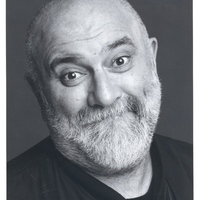Radio 4 recently began broadcasting a series called The Absence of Normal, dramatising some of Alexie Sayle's short stories. Episode one was entitled The Only Man Stalin Was Afraid Of, and starred two of the greatest voice actors of the age: Peter Capaldi and Peter Serafinowicz, both in fine sonorous form. Later episodes will feature wonderful young talents who will all be big stars in a year or two and then won’t take my calls.

Doing these shows reminds him of the time when he made his own comedy shows on TV in the 1980s and 90s. He was lucky enough to come under the last generation of senior BBC executives who were from a generation who had fought in the second world war. These (mostly) men ran the Light Entertainment department with a relaxed and tolerant attitude to three things: programmes containing innovative content, comedy that was likely to inflame “public opinion”, and alcohol consumed during lunch.
Today, these executives – having survived duty as tail-end Charlie in a Lancaster bomber or being torpedoed while on convoy duty in the North Sea – would be unlikely to be intimidated by angry tweets, a perceived need to pander to the “19-25 demographic” or bureaucratic interference from someone the age of their youngest grandchild.
Alas, this swashbuckling age has passed from TV, along with the predilection for boozy lunches in a Holland Park trattoria. Thankfully, some of its freebooting spirit survives in radio, and I am truly grateful over the last couple of years to have been enjoying a bit of a radio renaissance not just with The Absence of Normal, but also with my comedy show Alexei Sayle’s Imaginary Sandwich Bar.
His involvement with radio goes back a long, long, long way. So long in fact that he was once the recipient of the award for best comedy series at the Pye radio awards (which later became the Sony awards) for The Fish People – a series he made for Capital Radio, at the time London’s only music station. This prize occurred so far in the past that Pye, the awards’ sponsor, was a British-owned company that manufactured electronic goods – tape recorders, radios, TVs – in an actual factory in the UK. Can you imagine such a thing?
Then in 1988, there was his starring role as footballer Ricky Lenin in Lenin of the Rovers. Written by Marcus Berkmann and produced by the late Harry Thompson, it featured him as the Russian captain of Felchester Rovers, Britain’s only communist football team. It was so popular that, in 1992, the whole of series two was released by the BBC as a two-cassette set. For those of you who don’t know or can’t remember what a cassette is, it’s sort of like a podcast but made out of a thin transparent plastic box and half a mile of brown tape wound around little polycarbonate wheels that you could listen to on your Pye cassette machine.
This audio interview was recorded as he was about to venture out on a UK stand up tour;
However, it is not just the open-minded attitude of radio’s commissioning editors and the channel controller that makes radio such a joy to work in. In his experience, there also exists a strong bond between the radio audience and the performer. Radio engages audiences in a different way than television does: it is more intimate, the listener is not spoon-fed but has to participate in the experience imagining the faces behind the voices, the places where they stand. For many, it is a background companion as they go about their daily tasks. And if you do work listeners like, it will garner great appreciation.
Even if a show was badly received, old school executives would still make more – until the public caught up
One thing that is novel for him with the success of Alexei Sayle’s Imaginary Sandwich Bar is that nobody seems to hate it. He is not a performer who has been universally loved over the years (something of an understatement) but he got a look at the BBC’s audience log, the daily record of phone calls that come in to the station as programmes are transmitted. Negative comments are registered in red and positive feedback in black.
Normally, particularly in our age of complaint, the log is a sea of red, but in the hour or so after the first Sandwich Bar was broadcast, it changes briefly to an ocean of black with positive comments about his show. Remember, these are people who have made the herculean effort to pick up a phone, dial a number and make a call rather than just tap some angry words on to a keyboard. And they are phoning to pay a compliment because they were engaged and pleased rather than pushed to rage by something they’d heard.
One last thing about that old-school generation of executives: they thought the artistes knew what they were doing. If a show was well-received, they would make more of them. And if a show was badly received, they would still make more of them until the public caught up. So if any of their spirit still survives, there will be subsequent series of The Absence of Normal, no matter how it goes down.